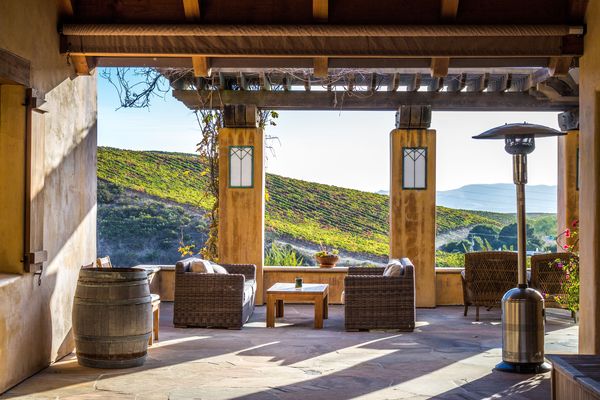
Jim: Speaking of recompense that’s hard to assess, are you in favour of this and how would you figure out compensation? A new study is out looking at sunshine.
The more sun a house gets, the higher its value.
This is possibly not a complete surprise, but the Motu Economic and Public Policy Research Trust has carried out the first research it says anywhere in the world, apparently, to evaluate the elevated value of a house’s sunshine hours. So how closely, first of all, do you look at sunshine, both of you, when choosing a house?
Full Audio Interview (transcription below):
Tracy: Huge. Absolutely. When we chose the house we’re in now that was probably just about top of the list.
Mark: Well, I live in Hanmer Springs. So if you want to live up on the hill, you don’t get the sun for about three months of the year. So a lot of us that live there permanently, live down the bottom because we’re going to get the sunshine. And it’s also the difference between winter and summer.
We’re just in the middle of a thing with the family at the moment to disposing of a family house, a family home, part of our wider family. And you’re not going to sell it in winter. There’s not enough sun, there’s not enough brightness and everything else.
And so I know it’s a wee bit different to having a house shade yours, but it very much the same situation. You need sunshine to light up the brain cells. It’s so critical for your own home as well.
Tracy: Yeah. It’s not just about asethetics, it’s not just about it’s nice to have the sun. It is. It’s about mental health. It’s also about passive solar ability to keep your house warm and just sort of stay sane.
We rented our house out– we rented a house for six months while we were renovating a house one time and the one we lived in had no sun at all. And there was a massive difference in our mood and also our children’s health when we lived in the sunless place.
Jim: Okay. That’s interesting information. And there will be people probably nodding their heads agreeing with you, having had a similar experience. Arthur Grimes is joining us. Arthur is a senior fellow at Motu and co-author of this study. Arthur, good afternoon.
Arthur: Hi Jim. How are you?
Jim: Nice to talk with you again. And congratulations. Someone had to think of doing this first.
Arthur: Yeah. Well, it’s the power of big data now. You can actually do the modelling of how much sun every single house gets at every hour of the day. And now you can do that. You can do the work.
Jim: How did you go about determining the value of more sun shining on a house, Arthur?
Arthur: So what we did is we took all the sales of Wellington houses over a number of years and then looked at how their prices varied according to, for instance, the number of bedrooms they have, their age, their floor area, etc.
And then looking at how much sun they got. And we then checked whether that was summer sun or winter sun and a whole lot of other things as well.
Jim: Okay. So you factored out obvious differences in the houses and ended up with sunshine?
Arthur: Yeah. That’s right. Well, basically, we can estimate the effects of all those things on the value of the house, or you can look at the value of an extra bedroom, the value of an older house, or having parking available, etc., and also the value of sunshine. So we do that using statistical techniques.
Jim: Okay. And in terms of the practical application, compensating the inhabitants of an existing house or an apartment block when you take away their sun, you’ve been able to put a monetary value on this somehow?
Arthur: Basically, every hour of extra sunlight you get on average per day is [inaudible].
Jim: Oh, Arthur’s momentarily disappeared.
Arthur: Oh, hang on. Can you hear me now?
Jim: The sun went from your phone.

Arthur: Sorry? Can you hear me now?
Jim: We can. You’re back.
Arthur: Yeah. So about every hour– on average, if you have an extra hour of sunlight per day, your house goes up in value by around two and a half percent. So you imagine an extra four hours of sunshine a day, your house is worth 10% more. It’s quite a lot of money, especially say on a million dollar house in Auckland.
So what we’re suggesting is that rather than have really restrictive building regulations as we do in Auckland and in other cities, instead we could say, “Well, if you’re going to build next door to a house and block the sun, then rather than restrict that, let’s compensate the people who are going to lose the sunshine.”
Because Auckland is a growing city. It’s going to need some intensification. Currently, we stifle development for good reasons because people do lose out when they lose their sunshine or whatever. So we’re saying, “Well, rather than stop the development, let’s compensate people.”
Jim: But developers, presumably, Arthur, are not going to want to pay a sunshine compensation levy?
Arthur: No. But it’s only fair that they do if they’re blocking somebody’s sunshine. So some developers will like this because it’ll enable them to go ahead with development that would otherwise be restricted. But on the other hand, it’ll cost them something.
Jim: Tracy and Mark, what do you think?
Tracy: I was just about to ask Arthur if people have to pay compensation if they block a view at the moment?
Arthur: No. They don’t. I mean, provided they’re building within their building envelope and the height limits, etc., that they’re allowed to build within.
Jim: Yeah. Are you arguing, Tracy, that this would apply to those kinds of disadvantages too?
Tracy: Yeah. I wondered whether sun and view should be treated in a similar way?
Jim: That’s–
Arthur: Yeah. We actually look at the value of views as well although that’s a harder one to get a handle on because one person’s great view is another person’s [laughter] sort of– they’re not so keen on it.
Mark: So, Arthur, did you have to go around and eyeball all the houses in this study to understand the sunshine?
Arthur: No. We’ve got a fantastic co-author who had access to Wellington City Council’s building envelope, which basically means that for every house, he could model how much sunshine it got at every hour of every day of the year, taking into account every other building that was around it and of course all the hills and valleys that are in Wellington.
Mark: Crikey. Incredible. Well done. That’s–
Arthur: It is incredible.
Mark: But if somebody rocked up to me and said, “You can have an hour’s less sunshine in your house, and we’ll give you the equivalent of two and a half percent,” yeah, “Well, actually, I probably need the sunshine.”
Jim: Yeah. But you might need the money. You know what I mean?
Mark: Yeah. Exactly. Yeah.
Jim: Okay. But this will become a huge issue in Auckland, as you are intuiting, Arthur. So what are going to do with this information in terms of trying to persuade people to have a compensation levy?
Arthur: Well, we’re going out to talk to people in local and central government, just about the findings there, and it’s up to them how they use it. But we’ve put forward the idea, and then we’ll see where they take it.
Jim: Is anyone else in the world putting a monetary value on this?
Arthur: No. We can’t find anybody in the world who’s done this. And we’ve talked to the top scholars in the world in this sort of area, and they’re not aware of anybody who’s put a statistically calculated value on sunshine.

Jim: It is such an interesting suggestion. But you’ve already alluded to this, the experience in the UK recently, where they have the same housing needs or a version of, was that councils wanted to speed up development.
And they wanted the bylaws protecting a house from being shaded, etc., to be dialed back because they needed speed. And that will be the issue in Auckland too, won’t it? There will be a determination to cram as many buildings and apartments onto smaller sites and hell for leather.
Arthur: And we saw the opposition to that with the unitary plan consultations in Auckland last year. And part of that, I think, you can get around some of that opposition, not all of it, but at least by saying, “Well, at least you’ll be compensated to some extent for somebody building next door to you and blocking your sun.”
Jim: Be very interesting to see how far this goes. All right. Arthur, thank you, and we’ll follow this with interest. Arthur Grimes, from the Motu Economic and Public Policy Research Trust.
Source: Radio New Zealand
P.S. Do you know of other people that will find this article useful? Please share it on social media. Thank you!